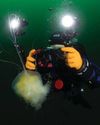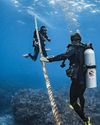
About 60 minutes after he surfaced from his second dive, Ted knew something was wrong. He was sick to his stomach, and he couldn’t stand up. He didn’t know what was going on, but nothing about his symptoms made sense.
THE DIVER
Ted was a 54-year-old active diver with no known medical conditions. He had been diving for nearly 20 years and regularly took trips to remote locations where he dived heavily for days in a row.
THE DIVES
Ted and his buddy had planned a series of dives over three days with a charter company. They regularly visited the destination and were familiar with the dive sites and the crew of the operation. Ted’s dives included the following:
» Day 1: Dive #1, 67 feet of seawater (fsw) for 42 min with a surface interval of 58 min; Dive #2, 58 fsw for 46 min.
» Day 2: Dive #1, 137 fsw for 29 min with a surface interval of 80 min; Dive #2, 82 fsw for 41 min with a surface interval of 73 min; Dive #3, 54 fsw for 50 min.
» Day 3: Dive #1, 132 fsw for 25 min with a surface interval of 122 min; Dive #2, 109 fsw for 36 min.
We don’t know their gas mixes nor their decompression schedules.
THE ACCIDENT
Ted and his buddy had planned a third dive for their last day, but Ted didn’t feel well and opted out. After an hour at the surface, he felt dizzy and nauseous. Even simple head movements made him so sick he would vomit. It felt like a sudden onset of seasickness, but if he remained still his stomach settled down. He couldn’t walk without support.
This story is from the June 2020 edition of Scuba Diving.
Start your 7-day Magzter GOLD free trial to access thousands of curated premium stories, and 8,500+ magazines and newspapers.
Already a subscriber ? Sign In
This story is from the June 2020 edition of Scuba Diving.
Start your 7-day Magzter GOLD free trial to access thousands of curated premium stories, and 8,500+ magazines and newspapers.
Already a subscriber? Sign In

Readers Choice: Best Destinations For Photography
Species diversity, ideal in-water conditions and weird wonders earn these destinations top honors

In It To Win It
Competition can help you improve your shots

Freediver
Breathing air from a tank isn’t the only way to explore beneath the waves.

Divided Focus
Underwater, it’s vital to remember what’s really important

A Studio In Your Hand
Video can bring non-divers into the underwater action

Underwater photography – Do No Harm
Tips for being an ethical underwater photographer

Ask Dan – Decompression sickness
How can I reduce my risk of decompression sickness?

SOUTH FLORIDA
A smorgasbord of wrecks and reefs ensures you’ l l never run out of photo ops in these warm waters

Sea Hero: JOHN WELLER
How one photographer’s mission to save the Ross Sea is bringing the planet together

16 TH ANNUAL PHOTO COMPETITION: OUR SPONSORS
What’s a contest without prizes? These generous donors—whose ranks include avid shooters like you—help make photographers’ dreams come true.